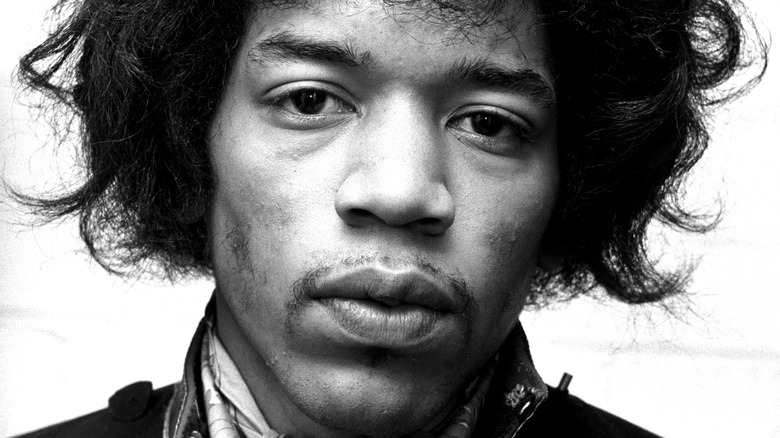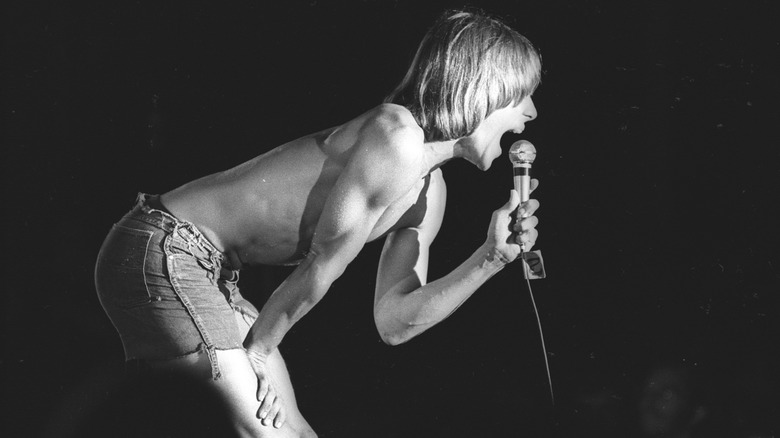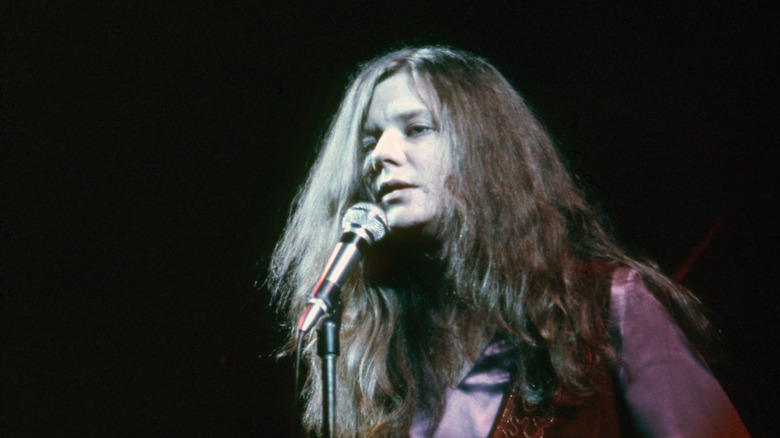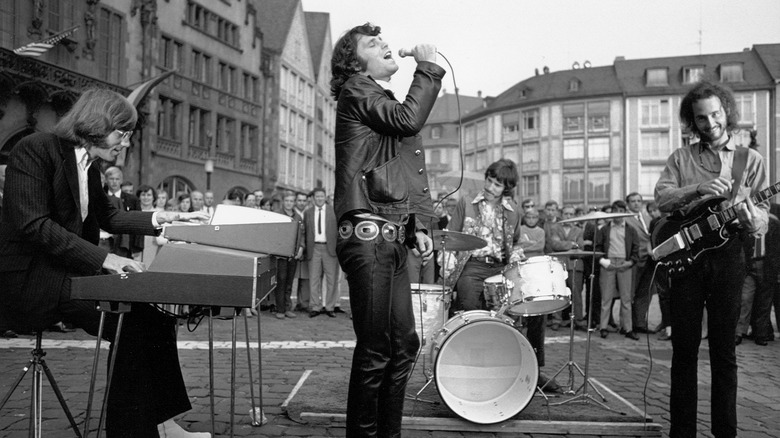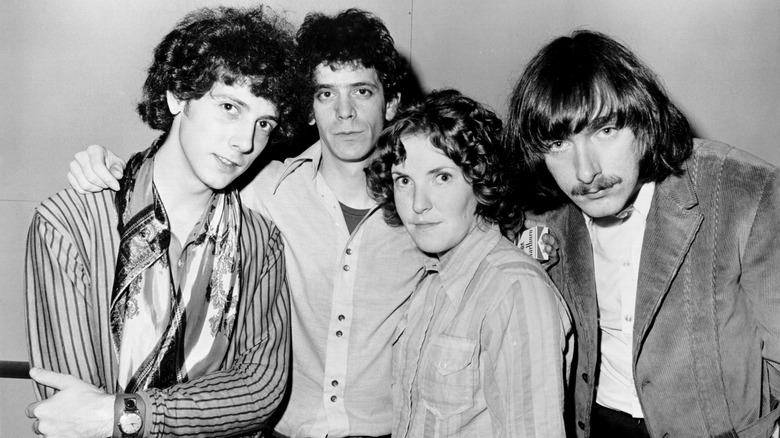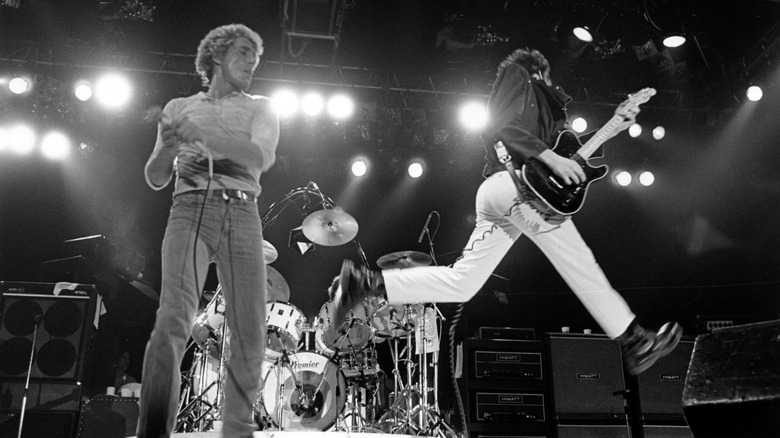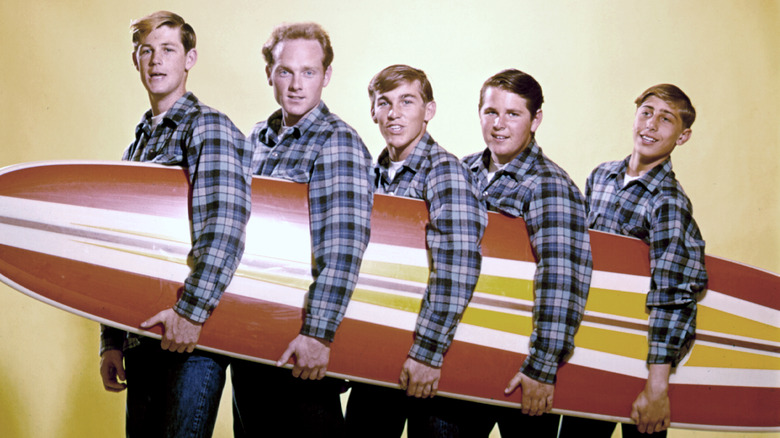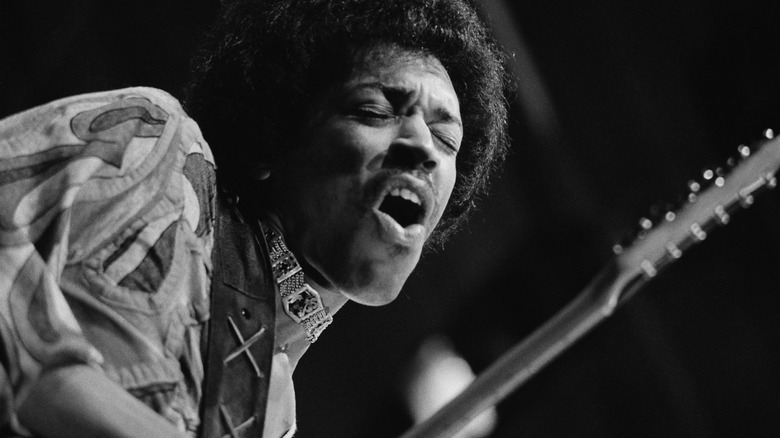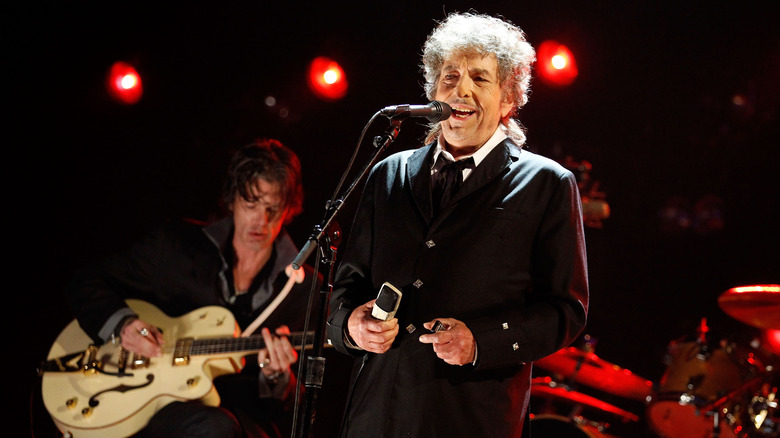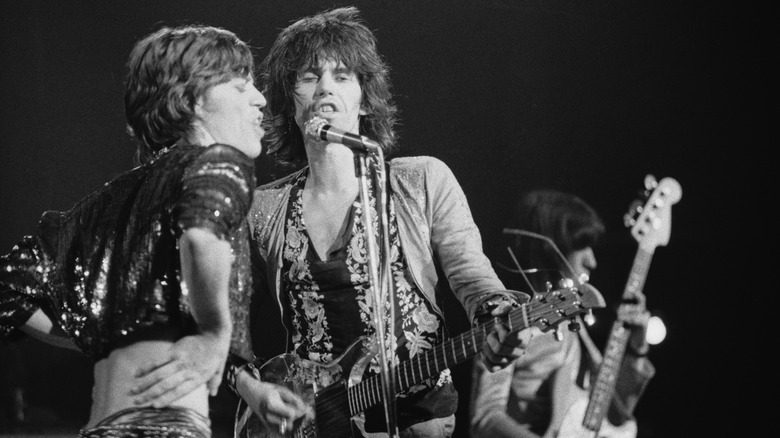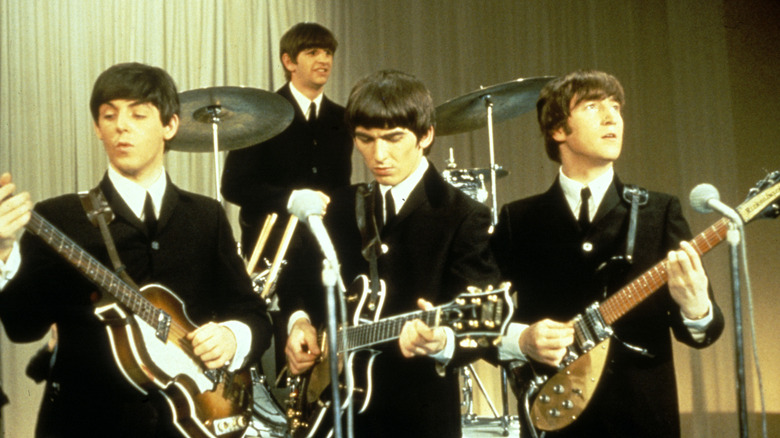Most Important Rock Bands Of The 1960s
The 1960s just might be the most important decade in the history of popular music. The '50s gave us Elvis Presley, Buddy Holly, and Chuck Berry. But the '60s, set to a backdrop of the Vietnam War, the sexual revolution, drug experimentation, and cultural divisions in the western world, is when rock n' roll music truly came into its own as the embodiment of counterculture and youthful rebellion. So many rock bands and artists came up to change the world during this period that so, so many groups — including Santana, Cream, The Yardbirds, the Byrds, the Monkees, the Animals, and Steppenwolf, among many others — simply couldn't fit on this list.
But the bands that did make the cut rank among the most revolutionary musicians and groups that have ever picked up a mic and a guitar. Some left a legacy that vastly outstripped their commercial success. Others still fill stadiums to this day. All of them were profoundly influential, knocking down walls, inventing genres wholesale, providing sonic blueprints still studied and copied to this day, and changing the world with some of history's most beloved songs. Decades later, and these instantly recognizable tunes still dominate classic rock radio.
From The Kinks to The Who to Jimi Hendrix, The Beach Boys, Janis Joplin and The Rolling Stones, these are the most important rock acts of the 1960s.
Iggy and the Stooges
The Ramones and The Sex Pistols are frequently cited as pioneers of punk rock, per Masterclass. But The Stooges, led by often-shirtless wildman Iggy Pop, were among the first bands to truly capture the essence of the genre.
Judy Berman argues as much for Pitchfork, saying that Iggy's live performances were full of uncontainable, furious energy. He wore dog collars, cut himself with glass, and gyrated across the stage in a way that many hard rock frontmen would study in decades to come. Other bands years later would further develop the sneering attitude and rapid power chords we typically associate with old school punk, but the spiritual foundations of the genre were hammered into the beer-covered ground of seedy clubs by the Stooges. It wouldn't be particularly out of the ordinary in 1979 or 1983. But for the late '60s, it was nothing short of revolutionary, even if, per the Guardian, the world had no idea what to do with these guys, costing them deserved commercial success.
But they've only gained respect in the years since, as their influence has become increasingly difficult to ignore. In 2010, after seven consecutive rejections, Iggy and the Stooges were finally inducted into the Rock and Roll Hall of Fame (via Ann Arbor News). Said Iggy to the crowd during their performance (he's still a sight to see all these years later), "Come on, rich people! Show us you're not too rich to be cool!" What's more punk than that?
Janis Joplin
It's common knowledge that the mid to late '60s were a time of countercultural revolution, often expressed through rock music. But this was a man's world. Not because women couldn't hack it, but because people thought women couldn't hack it. NPR interviewed Tracy Nelson, a female singer-songwriter who fought to find her place in a musical world dominated by everyone from Jimi Hendrix to The Grateful Dead to The Beatles. "I don't know how many musicians [told] me, 'Why do you want to do this?'" She recalls. "'This is no place for women. This is no business for a woman.' You know, 'Why not just stay home, find a man.'" It's depressingly familiar stuff for women in just about every field, even today.
Of course, NPR didn't get the chance to interview Janis Joplin, who joined the tragic ranks of the "27 Club" in death in 1970. But the "Queen of Rock" had already established herself as a rock legend by this point. By necessity, she did it by overcoming institutional barriers of sexism. Nelson continues, describing seeing Joplin play live: "I had to follow Janis Joplin, and I'm standing out there listening to her, and I'm just thinking, 'Man this is a force of nature.'"
"Force of nature" might be the closest words can come to describing Joplin's voice to the majority of us, who never had the privilege of hearing it live. The doors she broke down for female musicians have yet to close.
The Doors
For Rolling Stone, one of the elements that made the Doors so important was their recognition that, amidst all the flower power hippie sentimentality that dominated mid '60s mainstream rock, the decade had a dark side. Drugs, Vietnam, fierce national divisions. In that sense, the band was the embodiment of that era. Their music wasn't angry or particularly heavy. In fact, the band didn't even have a bass player, opting instead for organist Ray Manzarek to hold down the low end of the songs. And like other bands of their era, the guys in The Doors looked like anyone you'd run into on the street. But it was all dark and mysterious and rebellious and exciting in its own way.
Perhaps — in fact, certainly — frontman Jim Morrison indulged in that darkness because he was intimately familiar with the hedonism and drug abuse his music channeled the energy of. The article goes on to describe "The Lizard King" as something of a rebel without a cause, whose behavior stemmed from personal pain rather than an organized political viewpoint, and whose untimely death has both rehabilitated and immortalized his music as a symbol of youthful rebellion.
In another Rolling Stone article in which The Doors are listed as the 41st greatest artist of all time, Marilyn Manson writes, "They didn't sound anything like punk rock, but Morrison outshined everyone else when it came to rebellion and not playing by anyone else's rules."
The Velvet Underground
The Velvet Underground, the band led by Lou Reed, is one of those bands you always hear about but never hear. As Julian Casablancas points out for Rolling Stone (which ranked Velvet Underground the 19th greatest artist of all time), their music is almost nonexistent on classic rock radio.
"Why is it always Boston and Led Zeppelin?" He writes. "And why are the Rolling Stones so much more popular than the Velvets? ... But there is also a part of me that has always felt that it should have been the other way around." There's an argument to be made for that. Casablancas goes on to say the "Velvets" were ahead of their time and just plain weird (in the best way), and that their experimental music could transport you and teach you how to be yourself.
High praise. But how influential were they really? The BBC asks a provocative question: are they as important to music history as the Beatles? It claims that the Velvet's four studio records contained the DNA of everything from indie and alternative rock to nearly all forms of punk. Then it lists some artists who cite the Velvets as a foundational influence. The names are impressive: U2. The Sex Pistols. R.E.M. The Talking Heads. Sonic Youth. You're unlikely to stumble across Velvet Underground tunes on your morning commute. But if you like any alternative bands at all, you owe it to them to check out the '60s group that made it all possible.
The Who
Any conversation about the origins of hard rock simply must include a proper tribute to The Who. As Pearl Jam's Eddie Vedder writes for Rolling Stone (who listed The Who as the 29th greatest musical artist ever), "They wanted to be louder, so they had Jim Marshall invent the 100-watt amp. Needed more volume, so they began stacking them. It is said that the first guitar feedback ever to make it to record was on 'Anyway, Anyhow, Anywhere,' in 1965." He continues, talking about Pete Townshend's guitar-smashing. And of course, any rock fan knows late drummer Keith Moon trashed hotel rooms (per Ultimate Classic Rock). Others have done the same, but they did it first.
But The Who's legacy stretches beyond power chords and partying until dawn. "The Who told stories within the confines of a song," continues Vedder, "and, over the course of an entire album, pushed boundaries." He goes on to say "The Who quite possibly remain the greatest live band ever." That's subjective. But watch their shows and it's hard to argue they don't deserve to be a part of that conversation.
On "My Generation," Pete Townshend famously shouted, "I hope I die before I get old!" It didn't happen. He and frontman Roger Daltry, who still has that golden voice, are in their '70s. But as folk rocker Willie Nile said, according to a 2010 New York Post article, "They're still playing. Obviously it's not the '60s, '70s, or '80s, but the glory's still there."
The Beach Boys
Nothing you'll likely notice about The Beach Boys on the surface — from the five members smiling as they played, to their often matching, bright uniforms and harmless, nice guy haircuts, to the infectious earworm hooks and gorgeous harmonies on songs like "Good Vibrations" and "Surfin' USA" that were seemingly designed in a lab to put a smile on your face — betrays the darkness and turmoil that defined their story. Biography summarizes the rough upbringings, conflicts, firings, untimely deaths, and the tumultuous mental health journey of frontman Brian Wilson in more detail than can really be covered here.
But as Fleetwood Mac frontman Lindsey Buckingham writes for Rolling Stone (who ranked The Beach Boys the 12th greatest artist of all time), the group's legacy will never not be the magic of their music. "I remember hearing 'Surfin' Safari' first when I was in sixth grade," he notes. "It had the beat, the sense of joy, that explosion rock & roll gave to a lot of us. But it also had this incredible lift, this amazing kind of chemical reaction that seemed to happen inside you when you heard it."
The thing is, It doesn't really matter where you are when you hear a Beach Boys song — the bus, the office, in traffic. When those harmonies on "Pet Sounds" hit, you're simply transported: flying down a coastal California highway with the windows down and your arm out the window. That's the power of music.
The Jimi Hendrix Experience
Few people in history have changed the way an instrument is played more than Jimi Hendrix, namesake of the "Experience," changed the rock guitar. When he first arrived, the guitar was played with little distortion and only the simplest, most reserved solos. Hendrix reverse engineered it, unlocking entirely new forms of playing, and arguably becoming the first true guitar hero.
And as Rage Against The Machine's Tom Morello points out for Rolling Stone, he never seemed to break a sweat doing any of this. Playing the guitar appeared to come as easily and as naturally to Hendrix as breathing and speaking does for the rest of us. He experimented with distortion, shredding, whammy bars, and a funky tone in a psychedelic way that revolutionized music moving forward. The "Purple Haze" and "All Along The Watchtower" rocker's performance at Woodstock is the stuff of rock n' roll legend.
But Glider Magazine argues that the virtuoso's influence stretched far beyond the guitar, and he ultimately impacted everything from funk to '90s Seattle grunge rock to even hip hop music (due to him being frequently sampled and lyrically referenced). It all goes to show that the best way to leave a truly immortal legacy isn't just to write music that's still listened to years later, but to influence countless other artists, across multiple genres, who will carry your ideas and your creative spirit to new generations.
Bob Dylan
"I don't think Bob ever wanted to be more than a good songwriter," wrote Robbie Robertson for Rolling Stone (which has Dylan as the runner-up for greatest musical artist of all time). "When people are like, 'Oh, my God, you're having an effect on culture and society,' — I doubt he thinks like that ... I think Bob is thinking, 'I hope I can think of another really good song.' He's putting one foot in front of the other and just following his bliss."
Well whatever Bob is doing, it's working. Or, it has worked, rather, for the last several decades. Dylan changed the world through his songwriting and is one of the most significant figures in pop culture history. Like most other fascinating people who can be similarly described, he did it seemingly without trying. According to Robertson, he didn't even hang out with other musicians as much as he did with poets. Maybe that's how Dylan sees himself, then: a poet who just happens to sing the words and strum a guitar.
If so, he's not alone. When he won a Nobel Prize in 2016, it was for achievements in literature, not in music, notes Time Magazine. Most photos of the beloved folk-rock legend show him scowling and looking at something, anything, other than the camera. So maybe it's not a surprise that, according to that same article, Dylan ignored phone calls saying he'd won. He was probably just lost in his music, like the rest of us.
The Rolling Stones
You've probably heard it said a million times that classic rock bands and artists had their stylistic roots in the blues. So did the Rolling Stones, of course. According to U Discover Music, the blues is such an intimate part of their sonic DNA that they even took their name from a Muddy Waters song. Then, as per the same article, they went on to bring blues to a wider audience.
But their influence of the Rolling Stones didn't come close to stopping there. Their songs (via AllMusic) — "Satisfaction," "Paint It Black," "Get Off Of My Cloud," "Sympathy For The Devil," "You Can't Always Get What You Want," "Jumpin' Jack Flash," and so on — are timeless hits and still some of the most commonly heard tunes on classic rock radio. The article notes they also made iconic album covers and even influenced fashion, playing a huge role in replacing the suits-and-bowl-cuts look of old school '50s artists with the longer hair and wilder colors we more typically associate with rock stars. And it's worth noting that in a recent poll, per the Independent, their "tongue and lip" logo beat out the Nike swoosh and the Batman symbol to become the most iconic T-shirt logo ever.
But perhaps the Stones' greatest legacy to the world of rock was their attitude. Mick Jagger and Keith Richards still embody the sneering, rebellious spirit of rock n' roll, despite somehow surviving long enough to become respected elder statesmen of the genre at large.
The Beatles
It hardly needs to be said. The Beatles aren't just the greatest band of the 1960s, but are in the running for the most important musical artist of all time. So says Rolling Stone, anyway, on its list of greatest artists. It's one of those lists where fans can argue themselves to death over who should outrank who, or be included at all. But few would argue with the placement of The Beatles at the top of the pile.
Elvis Costello had the honor of writing their entry here. "Every record was a shock when it came out," he said, noting that Beatles albums had a tendency to redefine what was even possible in music (which another Rolling Stone article agrees with). "They made writing your own material expected, rather than exceptional." This was a band that seemed to know it wouldn't stick together forever, and it set out to revolutionize music as much as possible in just a few years in the late '60s.
What's strange is that they weren't even performing live for a good chunk of that short span. NME says that they stopped doing concerts well before their split, because the crowds drowned out their playing. Elvis Costello continues, noting that even today, when he saw Paul McCartney play Beatles hits all these years later, "the crowd's reaction was so intense that it all but drowned the song out. It was very thrilling but also rather disconcerting ... The songs weren't theirs anymore. They were everybody's."
